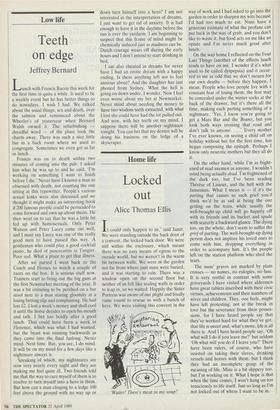Home life
Locked out
Alice Thomas Ellis
It could only happen to us,' said Janet. We were standing outside the back door of a convent, the locked back door. We were still within the enclosure, which meant there was no easy means of egress to the outside world, but we weren't in the warm bit between walls. We were in the garden not far from where past nuns were buried, and it was starting to rain. There was a window open on the second floor but neither of us felt like scaling walls in order to leap in, so we waited. Happily the Sister Portress was aware of our plight and finally came round to rescue us with a bunch of keys. We were visiting this convent in the 'Waiter! There's meat in my soup!'
way of work and I had asked to go into the garden in order to sharpen my wits because I'd had too much to eat. Nuns have a generous estimate of what the profane can put back in the way of grub, and you don't like to waste it, but food acts on me like an opiate and I'm never much good after lunch.
On the way home I reflected on the Four Last Things (another of the effects lunch tends to have on me. I wonder if it's what used to be called dyspepsia) and it occur- red to me as odd that we don't mourn for our own deaths — before they happen, I mean. People who love people live with a constant fear of losing them: the fear may be concealed under the winter socks at the back of the drawer, but it's there all the time, making each parting something of a nightmare. 'Yes, I know you're going to get a Mars Bar and the Beano, but you look both ways crossing that road and don't talk to anyone. . . .' Every mother I've ever known, on seeing a child off on holiday without her for the first time, has begun composing the epitaph. Perhaps I know only neurotic mothers but they all do It.
On the other hand, while I'm as fright- ened of mad axemen as anyone, I wouldn't mind being actually dead. I'm frightened of the dark too, but I've been reading Therese of Lisieux, and the hell with the Jansenists. What I mean is — if it's the parting that causes us such grief you'd think we'd be as sad at being the one getting on the train, while usually the well-brought-up child will go happily off with its friends and its bucket and spade with scarcely a backward glance. The dying too, on the whole, don't seem to suffer the grief of parting. The well-brought-up dying person does not implore his loved ones to come with him, dropping everything in order to accompany him. It's the people left on the station platform who shed the tears.
The nuns' graves are marked by plain crosses — no names, no eulogies, no fuss. It is very restful in contrast with some graveyards I have visited where aldermen have great tablets inscribed with their civic virtues, achievements and their numbers of wives and children. They, one feels, might have left protesting, not at the break in love but the severance from their posses- sions, for I have heard people say that they've worked hard for what they've got, that life is sweet and, what's more, life is all there is. And I have heard people say, 'Oh what will I do if you leave me?' but seldom 'Oh what will you do if I leave you?' There have been rulers, of course, who have insisted on taking their slaves, drinking vessels and horses with them, but I think they had an incomplete grasp of the meaning of life. Mine is a bit slippery too, but I'm working on it. What I hope is that when the time comes, I won't hang on too tenaciously to life itself. Just so long as I'm not locked out of where I want to be in.


































































 Previous page
Previous page